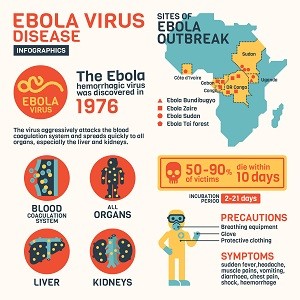Things that are unknown tend to be the scariest. We have a fear factor about Ebola virus and now we have it here on US soil. We have little information except rumors that an infected person’s pet dog was destroyed in Spain. Now Nina Pham’s Cavalier spaniel is being quarantined. Has a pet ever served as a reservoir?
Applebrook Animal Hospital owner and chief veterinarian, Dr. Kathryn Primm, wants people to have the facts as we know them. According to the CDC, animals do not seem to a factor in the ongoing transmission in this season’s outbreak. www.applebrookanimal.com
How is it Spread?

“Fruit bats are thought to be the natural reservoir for the Ebola virus in Africa but North American fruit bats do not seem affected at this time,” Dr. Primm says. “This could be because they have not been exposed or they have a natural resistance. We do not know.
However, just because they are not a factor at this time, it seems pertinent to know the facts and be prepared, rather than suffer in hindsight. If they Hospital in Texas had been more through, the second nurse would never have gotten on a plane, possibly spreading the virus further.
Dr. Primm advises that no one should ever attempt to touch a bat – living or dead.
“I have never personally experienced an Ebola patient or even a pet thought to be exposed, but knowledge is power and everyone needs to know the real facts” Primm said.
How High is the Risk of Outbreak?
The risk of widespread outbreak in the US is low and therefore the risk to pets is low also. The CDC has published some FAQs about Ebola and Pets and it should be noted that even in areas where infection is widespread, there have no reports of dogs or cats becoming sick or being able to spread the disease.
Ebola is spread by contact with infectious body fluids. The CDC reports that there is no evidence of vector transmission (i.e. mosquitoes, etc.)or airborne transmission. In humans and primates, early symptoms include fever and loss of interest in food. One study showed that some stray dogs in endemic areas tested positive for exposure (antibody production) but showed no sign of illness or carrier state.
What about Testing?
There would not be a reason to test a dog or cat for Ebola if there was no exposure to a person infected with Ebola. Currently, there the CDC says there is no routine testing for pets, Dr. Primm notes, but there must be laboratory testing that is not available to pet owners because they have tested some of the African dog populations for research purposes. However, this is not widely available.
What about Traveling?
CDC requires that dogs and cats imported into the US be healthy and vaccinated for Rabies. Monkeys and African rodents are not allowed to be imported as pets under any circumstances.
“Since there are no documented cases of pets becoming ill from the Ebola virus, the best advice is to use common sense when traveling with a pet,” Dr. Primm says. “Always wash your hands frequently. If your pet is ill, be sure you tell any pertinent travel history to your veterinary professionals.”
Raw Diet Risk
“Since Ebola virus has been linked to the consumption of ‘bushmeat’ (raw wild animal meat), I think one thing that would be smart to do is to avoid the feeding of raw meats to pets. It is just one easy step we can take to minimize risk and since bats are known to carry rabies in the US, never ever attempt to touch a bat, living or dead.” Dr. Primm adds. “I never recommend the consumption of a raw diet, for pets or people. There are several pathogens spread in this way and I just don’t think it is worth the risk.”
About the Author
Based in Wilsonville, Ore., animal lover Kristina N. Lotz is a Certified Professional Dog Trainer – Knowledge Assessed (CPDT-KA) and works as a full time trainer. She is the founder of A Fairytail House, a unique all-positive all-sport dog training facility that helps rescue dogs in her area and provides free seminars and training classes for the community. In her spare time, she trains and competes in herding, agility, obedience, rally, and conformation with her Shetland Sheepdogs. She smartly married a Veterinary Technician, who helps keep the fur kids happy and healthy, and provides a quick resource for articles.
 Toledo, United States.
Toledo, United States.